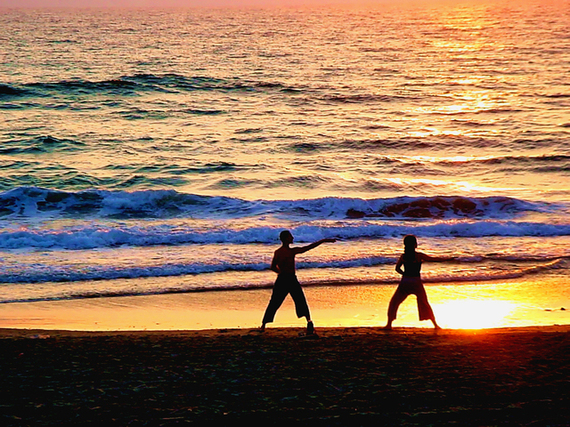
Tai Chi and Qigong are one way to pursue the question of "Who Am I?" Ultimately each of us has the challenge of finding our own path. The first time I did qigong I knew this was mine. It wasn't an intellectual decision.
Sri Ramana Maharshi who devoted his life to pursuing the spiritual question "Who Am I?" followed another path in the hills of India. Whenever you have a thought, he said, ask "Who is having that thought?" and it will send you back to the question "Who Am I?" Though many have moments of realizing the oneness of everything, he came to that profound and spiritual place suddenly and at the very young age of 16 and is purported to have permanently stayed in that place of clarity consistently for the rest of his life.
He also is quoted as saying:
Silence is the true upadesa (*teacher). It is the perfect upadesa. It is suited only for the most advanced seeker. The others are unable to draw full inspiration from it. Therefore, they require words to explain the truth. But truth is beyond words; it does not warrant explanation. All that is possible is to indicate It. How is that to be done?
Most of us don't qualify as the most advanced. We are where we are, so I ponder when and how are words helpful a lot. One of my teachers, a tai chi and qigong master and Traditional Chinese Medicine doctor, Ming Wu, often teaches with few words. It is both profound and sometimes frustrating. I once said to him, "I think I explain too much." He responded, "I could explain more."
I think about this question when I write, when I teach tai chi and qigong, and when I am with patients as a psychotherapist. I think about it when I am in Tai Chi class, too. Sometimes I want Dr. Wu to explain something and he says, "Figure it out." On those days when it wasn't clear to me what I was trying to figure out, it could feel a little harsh or withholding, I came to realize that he meant it to be softer and more as an encouragement, as in "You will figure it out."
He encourages all of his students to consider this question "Who Am I?" from every angle, the body, the mind, and the spirit, implying that they are just three parts of one. He says, tell your story. It will help others find their way.
Some may quibble with this. They might say this is just an exercise in ego, taking you further away from, not closer to, Truth. Maybe this is so, but maybe it is a matter of intention. For me, my health miseries have helped me consider the body as one path to pursuing this question. As a physician this path still intrigues me. My psychoanalytic teachers said it slightly differently than the Chinese and Indian spiritual guides, but at its essence I think the message was the same, "All roads lead to Rome."